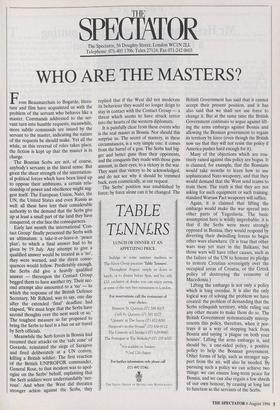SPECTATOR
The Spectator, 56 Doughty Street, London WC1N 2LL Telephone: 071-405 1706; Telex 27124; Fax 071-242 0603
WHO ARE THE MASTERS?
From Beaumarchais to Bogarde, litera- ture and film have acquainted us with the problem of the servant who behaves like a master. Commands addressed to the ser- vant turn into humble requests; meanwhile, more subtle commands are issued by the servant to the master, indicating the nature of the requests he should make. Yet all the while, as this reversal of roles takes place, the fiction is kept up that the master is in charge. The Bosnian Serbs are not, of course, anybody's servants in the literal sense. But given the sheer strength of the internation- al political forces which have been lined up to oppose their ambitions, a certain rela- tionship of power and obedience might sug- gest itself. The European Union, Nato, the UN, the United States and even Russia as well: all these have lent their considerable authority to the demand that the Serbs give up at least a small part of the land they have conquered, or else face the consequences. Early last month the international 'Con- tact Group' finally presented the Serbs with an ultimatum: a take-it-or-leave-it 'peace plan', to which a final answer had to be given by 19 July. Any attempt to give a qualified answer would be treated as a 'no', they were warned, and the direst conse- quences would follow. Predictably enough, the Serbs did give a heavily qualified answer — thereupon the Contact Group begged them to have another try. Their sec- ond attempt also amounted to a 'no' — to which the response of the British Defence Secretary, Mr Rifkind, was to say, one day after the extended 'final' deadline had elapsed, 'We must hope that the Serbs have second thoughts over the next week or so.' The toughest measure so far proposed to bring the Serbs to heel is a ban on air travel by Serb officials. Meanwhile the Serb forces in Bosnia had resumed their attacks on the 'safe zone' of Gorazde, reinstated the siege of Sarajevo and fired deliberately at a UN convoy, killing a British soldier. The first reaction of the British UNPROFOR commander, General Rose, to that incident was to apol- ogise on the Serbs' behalf, explaining that the Serb soldiers were understandably 'ner- vous'. And when the West did threaten stronger action against the Serbs, they replied that if the West did not moderate its behaviour they would no longer deign to stay in contact with the Contact Group — a threat which seems to have struck terror into the hearts of the western diplomats.
It is painfully clear from these events who is the real master in Bosnia. Nor should this surprise us. The secret of mastery, in these circumstances, is a very simple one: it comes from the barrel of a gun. The Serbs had big- ger and better guns than their opponents, and the conquests they made with those guns amount, in their eyes, to a victory in the war. They want that victory to be acknowledged, and do not see why it should be trimmed back, even cosmetically, at our request.
The Serbs' position was established by force; by force alone can it be changed. The British Government has said that it cannot accept their present position, and it has also said that we shall not use force to change it. But at the same time the British Government continues to argue against lift- ing the arms embargo against Bosnia and allowing the Bosnian government to regain its territory by force (even though the British now say that they will not resist this policy if America pushes hard enough for it).
Many of the objections which are rou- tinely raised against this policy are bogus. It is claimed, for example, that the Bosnians would take months to learn how to use sophisticated Nato weaponry, and that they would demand that the West send teams to train them. The truth is that they are not asking for such equipment or such training; standard Warsaw Pact weaponry will suffice.
Again, it is claimed that lifting the embargo would make the war spread into other parts of Yugoslavia. The basic assumption here is wildly improbable: it is that if the Serbs were more strongly opposed in Bosnia, they would respond by diverting their dwindling forces to begin other wars elsewhere. (It is true that other wars may yet start in the Balkans; but those wars will have other causes, such as the failure of the UN to honour its pledge to restore Croatian sovereignty over the occupied areas of Croatia, or the Greek policy of destroying the economy of Macedonia.) Lifting the embargo is not only a policy which is long overdue. It is also the only logical way of solving the problem we have created: the problem of demanding that the Serbs relinquish territory, while ruling out any other means to make them do so. The British Government systematically misrep- resents this policy, therefore, when it por- trays it as a way of stepping back from Bosnia and saying 'a plague on both your houses'. Lifting the arms embargo is, and should be, a one-sided policy, a positive policy to help the Bosnian government. Other forms of help, such as stronger sup- port from the air, will also be needed. By pursuing such a policy we can achieve two things: we can ensure long-term peace for Bosnia, and we can also regain a few shreds of our own honour, by ceasing at long last to function as the servants of the Serbs.


















































 Previous page
Previous page